Rich, luxurious, fudge-like Mysore Pak is a famous Indian treat that is simultaneously buttery and nutty, and will simply melt in your mouth. Made with just three ingredients – gram flour (besan), ghee and sugar – this Ghee Mysore Pak recipe is a perfect introduction to candy-making.
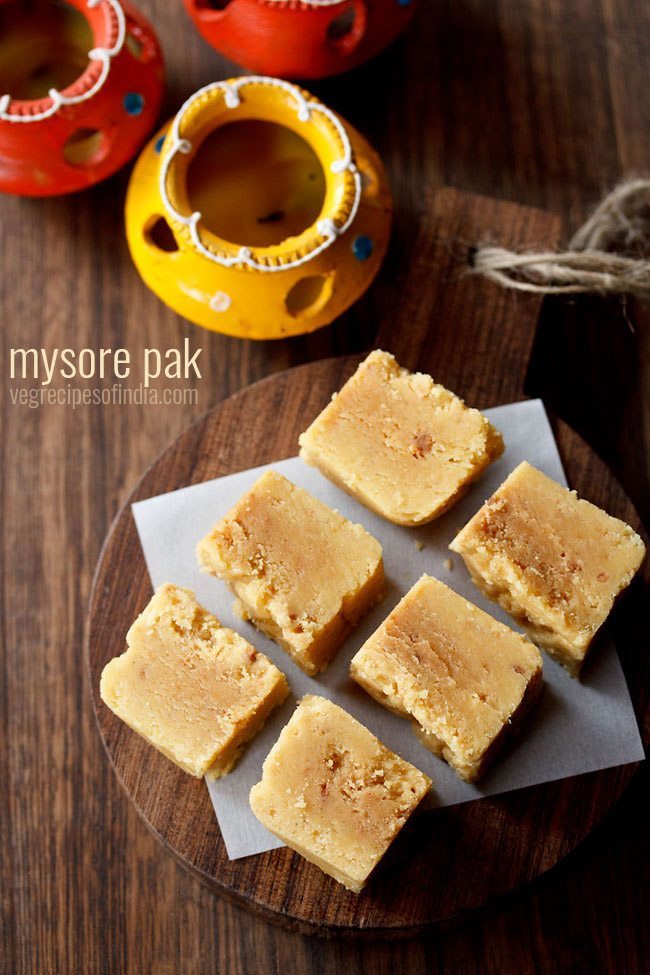
Table of Contents
About This Mysore Pak Recipe
Mysore pak recipe is a super delicious and popular sweet with origins at Mysore (also spelled Mysuru) Palace. This traditional recipe is attributed to Kakasura Madappa, the chief chef of Maharaja and food-lover Krishnaraja Wodeyar IV, who ruled until 1912.
Pak, paka or pakka means “sweet,” and in this case refers to the sugar syrup the candy is prepared with. But while the name Mysore Pak may explain where the treat comes from, no name could do justice to its flavor.
Mysore pak is made with just three ingredients – gram flour, ghee and sugar. However, do not let its simplicity fool you. This, my friends, is a candy-making recipe. Here, following the instructions is paramount to your success. In case you didn’t know, candy making is serious business!
Transforming gram flour, sugar and ghee into the soft, fudgy, toffee-flavored sweet takes some real dedication. Prepare yourself for scientific precision followed by a heck of an arm workout. This is not a recipe for the faint of heart.
However, if you have ever tried a decadent bite of Mysore Pak, you know that it is well worth the effort. With a superlative texture that varies from being hard or soft, my recipe gives a texture that is neither hard nor very soft. Plus with a flavor that is not too sweet, this candy – rife with notes of nut and toffee – is almost enough to leave you breathless.
If you are brave enough to try this recipe, you will have a wonderful sweet that is worthy of celebrations and festivals. The sense of accomplishment after making candy is pretty great, too. So come along with me, if you dare! 😉
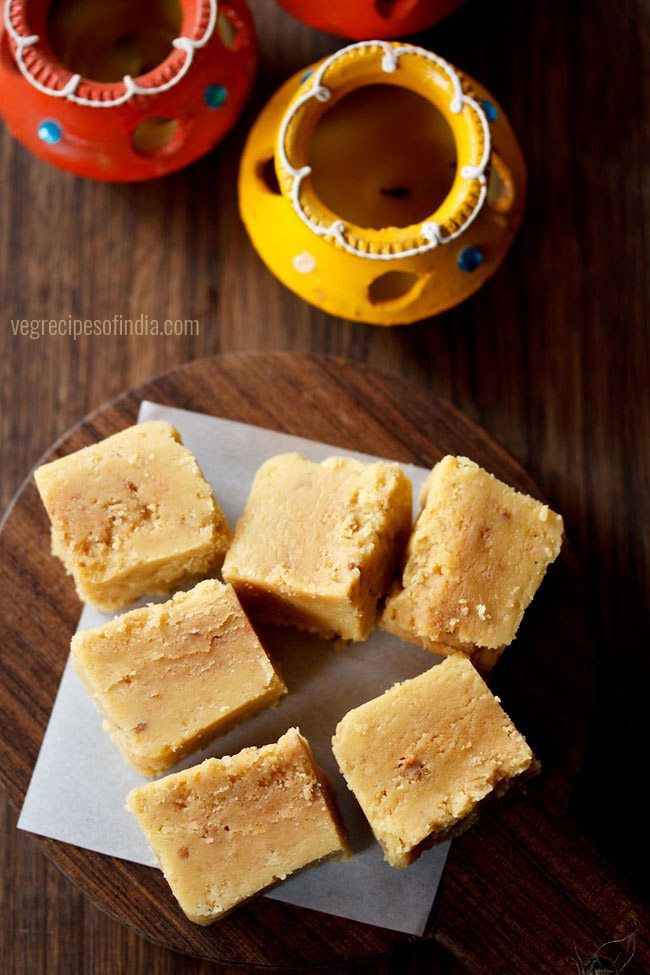
How to make Mysore Pak
I have shared extensive process shots of the making of mysore pak with a LOT of details and tips mentioned in the steps. I highly recommend you read this section through at least once before attempting to recreate it.
Prep
1. First, set up your ingredients:
- 1.25 cups sugar (200 to 210 grams sugar)
- 1 cup gram flour (besan) (100 grams)
- 1 cup ghee (200 to 210 grams)
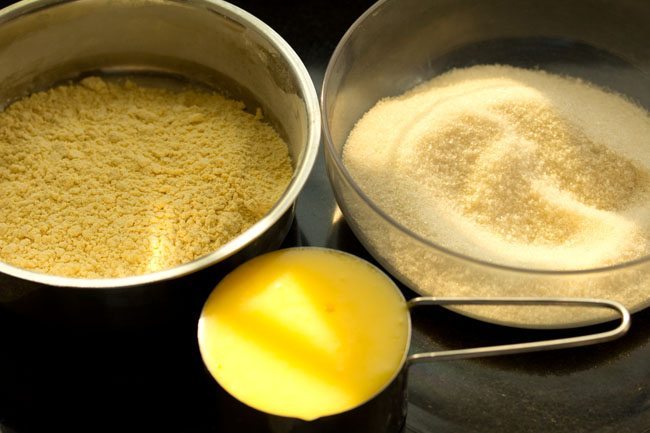
2. Sieve the gram flour once or twice. This helps in reducing the lumps if any while mixing gram flour in the sugar syrup.
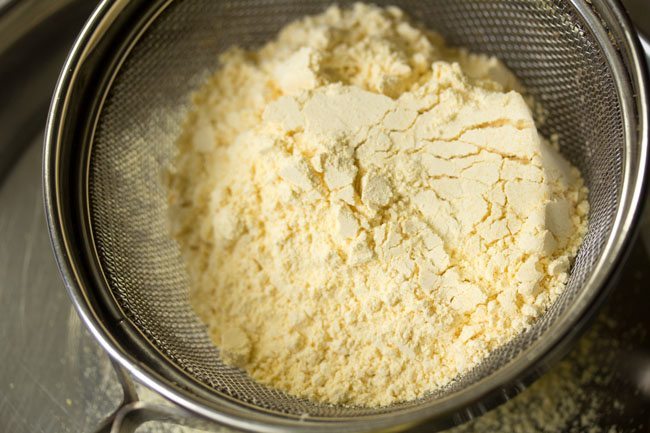
3. A photo of the sifted gram flour below.
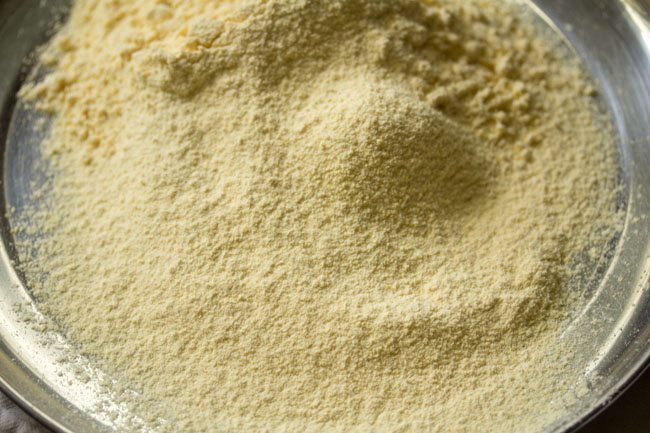
4. Grease a loaf pan with some ghee. If you don’t have a loaf pan, use any pan or tray which can give you some depth and height, so that you can get rectangular or square pieces of mysore pak.
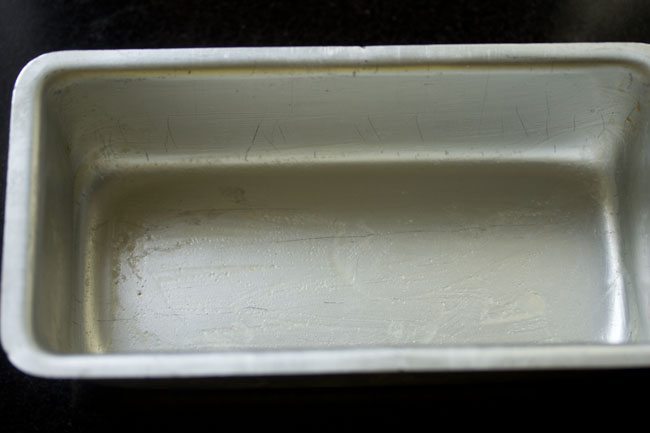
Make Sugar Solution
5. Now add the sugar to a heavy, thick-bottomed kadai. Use a heavy and large aluminium or iron kadai.
Please DO NOT use non-stick pan as the heat and friction from stirring can remove the coating.
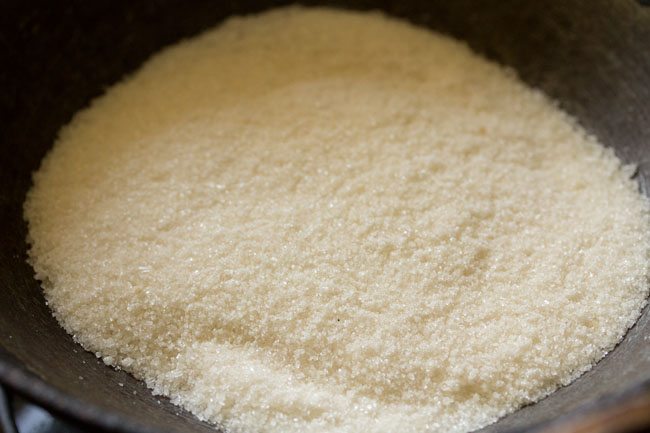
6. Add ½ cup water in the sugar.
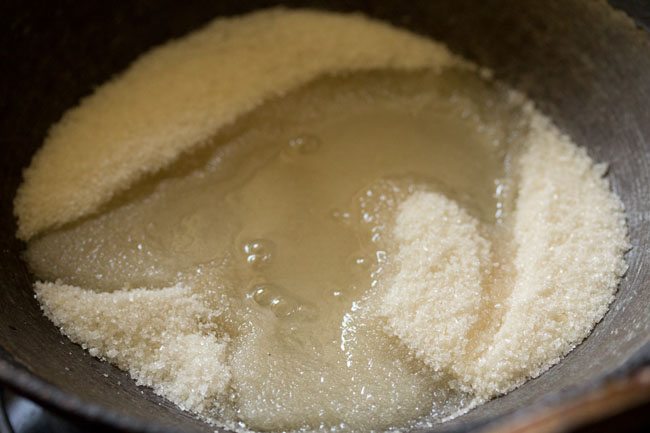
7. Keep the pan on the stove top. On a medium-low or medium heat, heat the sugar syrup.
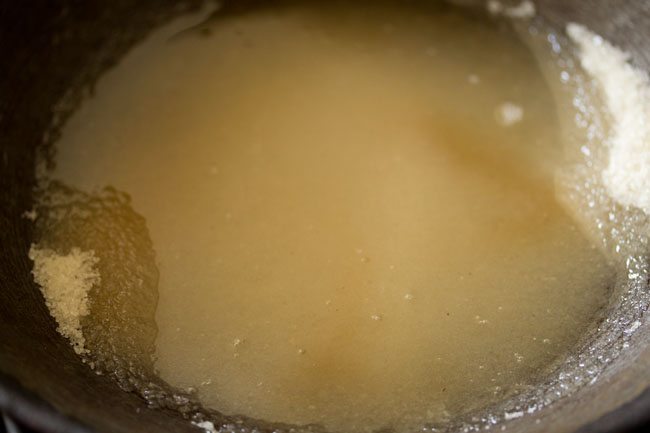
8. Stir so that the sugar dissolves.
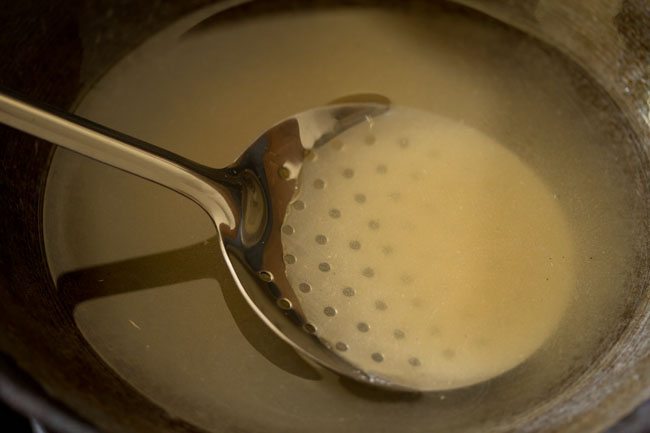
Heat Ghee (Clarified Butter)
9. Simultaneously, add the ghee to separate pan and keep it on the stove top.
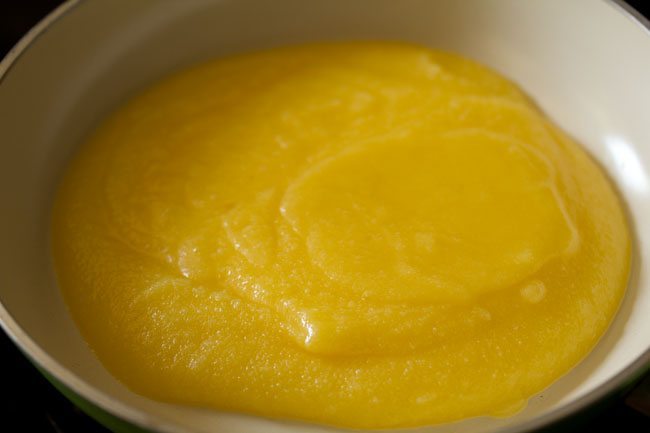
10. Let the ghee melt on a low heat. The ghee has to be hot when we add it to the gram flour mixture, but it should not exceed a slow simmer.
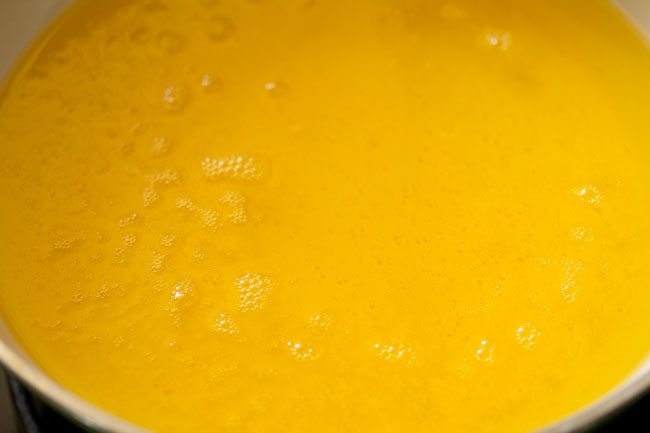
11. Let the sugar syrup start bubbling and boiling, then add the gram flour.
Note: we are not looking for thread consistency here. Add the gram flour immediately after the simple syrup comes to a boil.
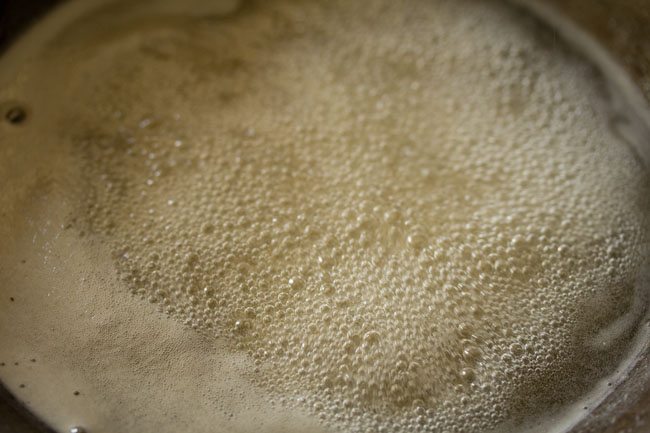
Cooking Gram Flour With Sugar Syrup
12. Add the gram flour in 3 to 4 stages to the sugar syrup. First, add some of the gram flour.
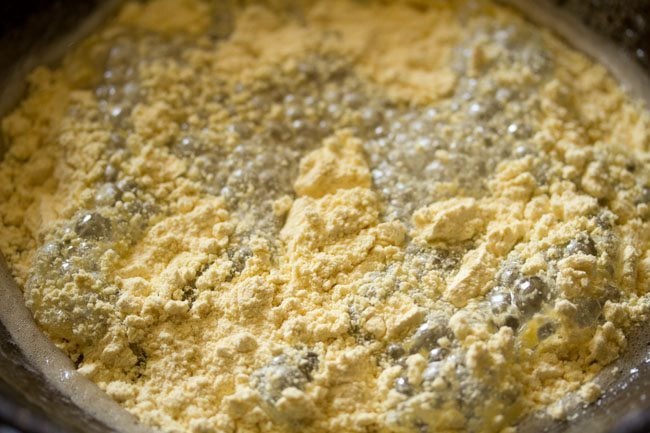
13. With a wired whisk, stir the gram flour briskly so that it dissolves with the sugar solution.
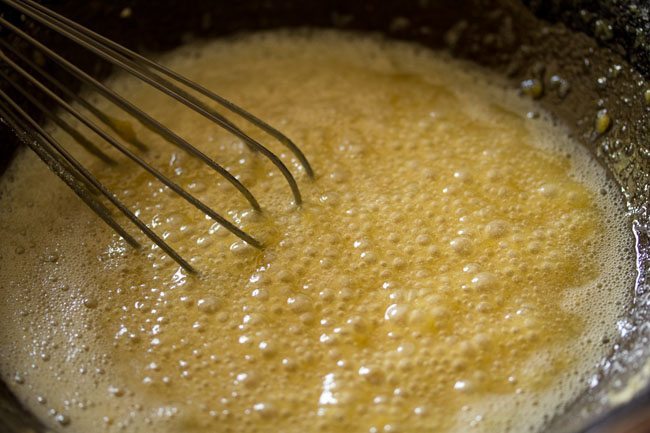
14. Now with one hand, using a spoon, add a bit more of the gram flour, and with the other hand continue to whisk.
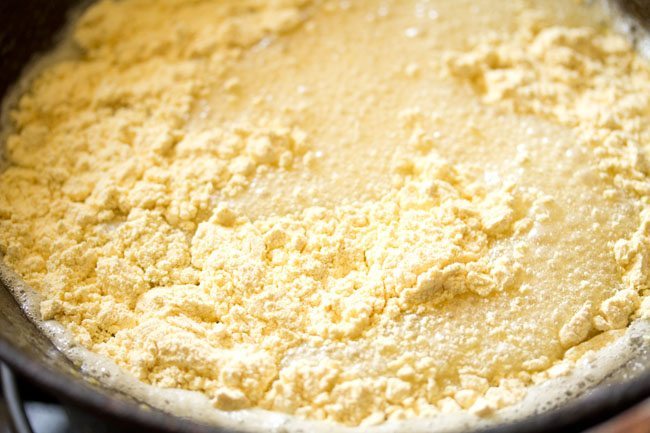
15. Continue until all of the gram flour is absorbed into the mixture.
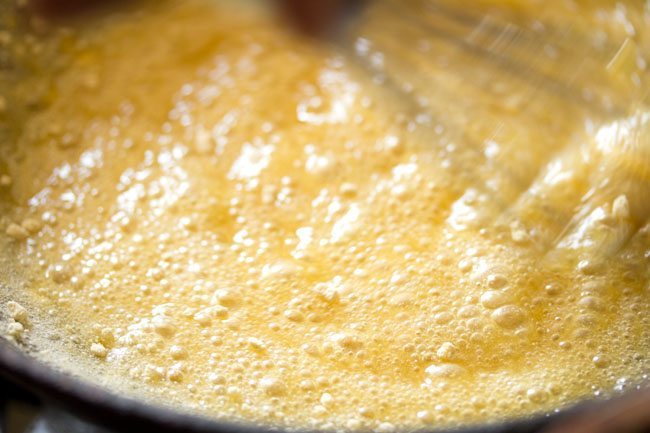
16. Stir very well, so that the gram flour is evenly mixed with the sugar syrup.
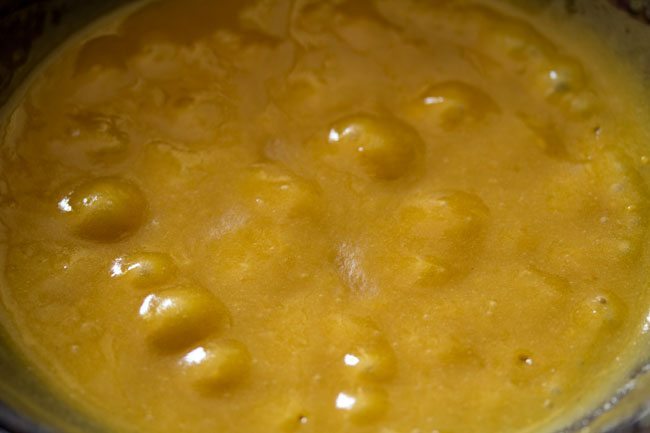
Add Ghee
17. Working carefully, add ghee in parts. First add a ladle full of the hot ghee.
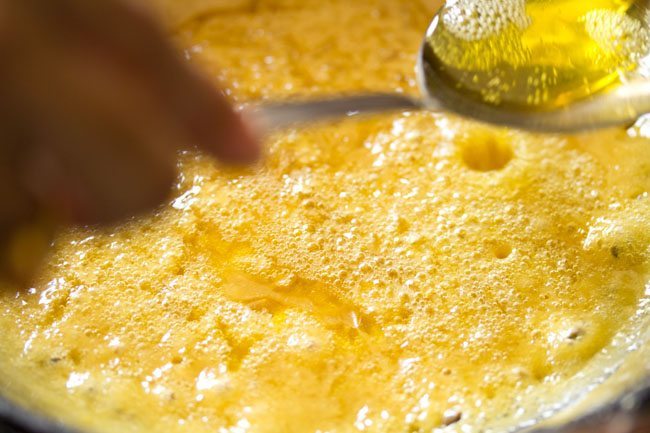
18. You will see a lot of bubbles and frothing in the gram flour mixture after you add ghee.
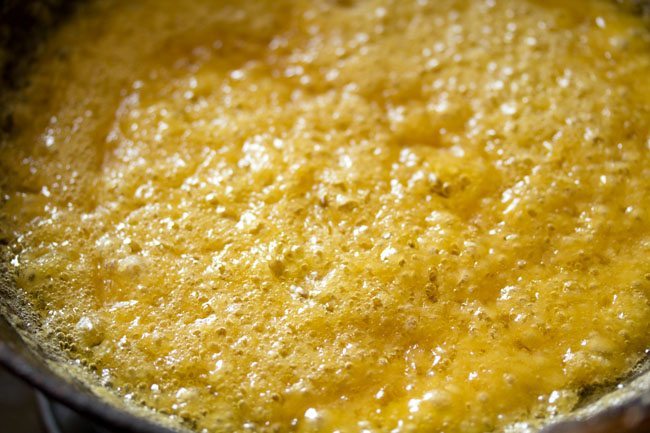
19. As soon as you add ghee, mix it with the gram flour with a spoon or spatula.
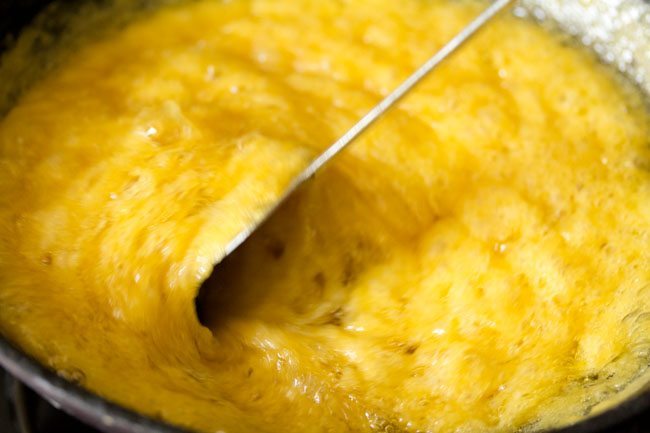
20. Then add the second part of ghee and again mix it very well. Keep the heat to a medium-low or medium.
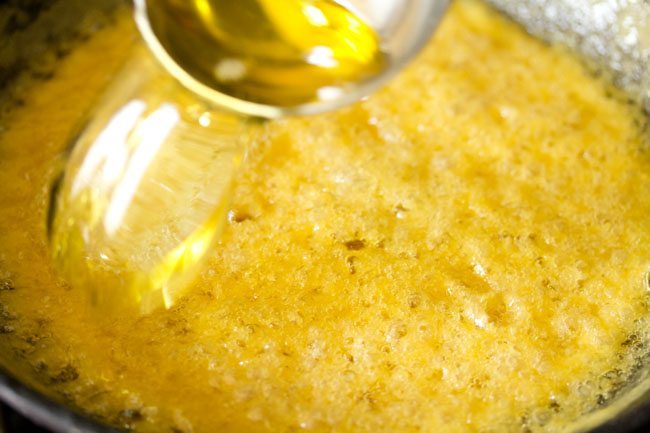
21. Continue the pattern – with one hand using a ladle, add ghee, and with the other hand mix it with a spatula – until all of the ghee is absorbed into the mixture.
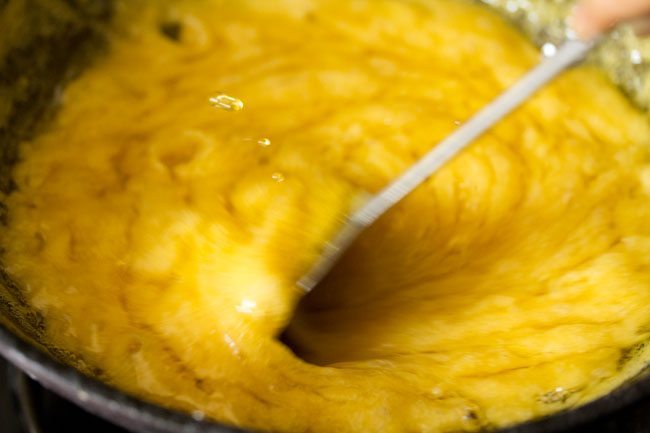
22. Be sure to use a bigger kadai and wear gloves and long sleeves, as there is a lot of sizzling, frothing and bubbling that happens.
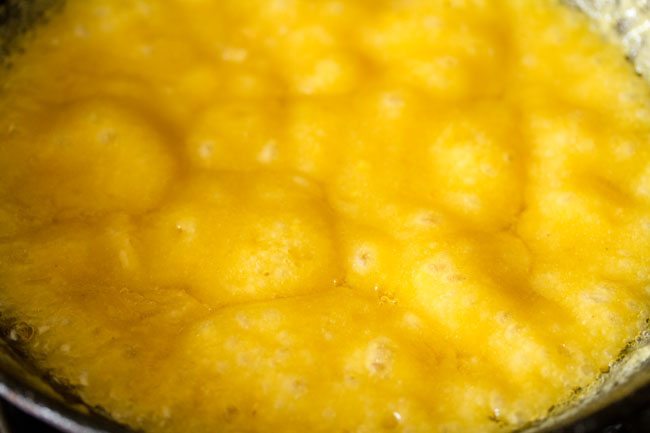
23. All the ghee will be absorbed first and what you will see is a smooth, molten mixture.
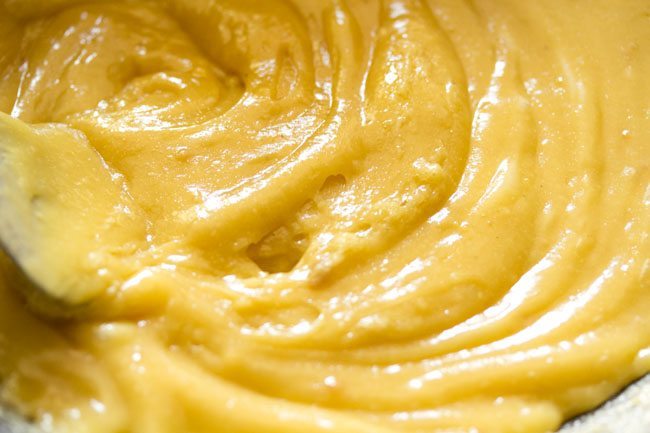
Cook Mysore Pak Mixture
24. On a medium-low to medium heat continue to cook and continuously stir the mixture.
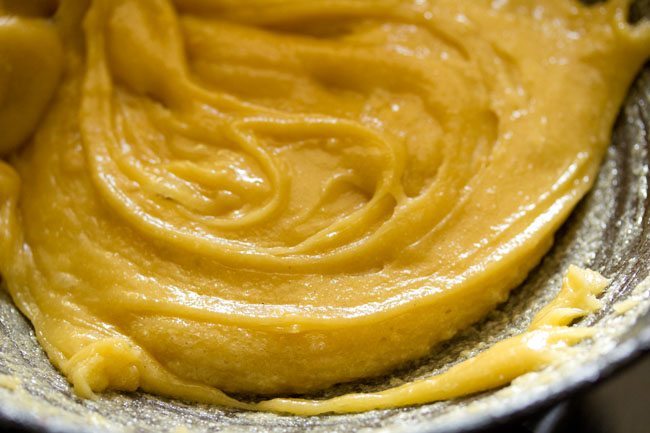
25. You have to continue to cook and stir till you start seeing bubbles in the mixture and the ghee is beginning to separate from it. The mixture will also start to leave the sides of the kadai or pan.
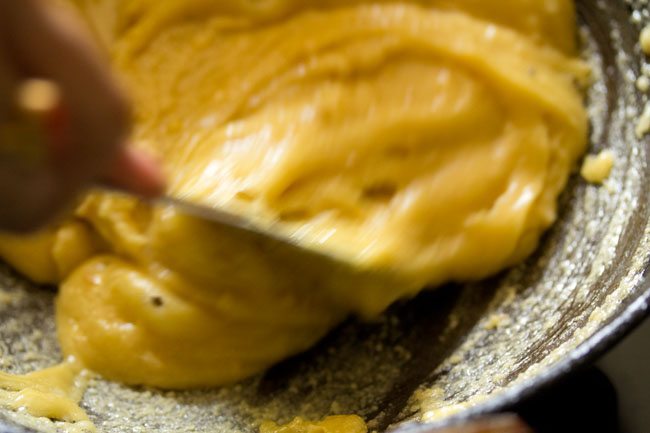
26. Continue to cook and stir.
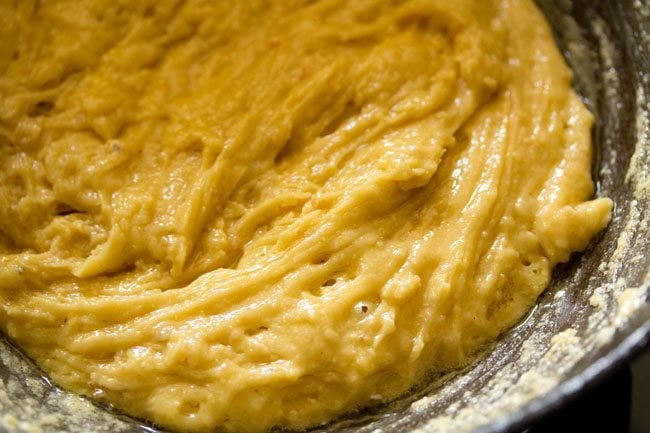
27. Note: Be sure to scrape the bottom and sides of the kadai as you stir to prevent browning, sticking and burning. I recommend using a flat steel spatula (palta) as this helps in scraping the mixture.
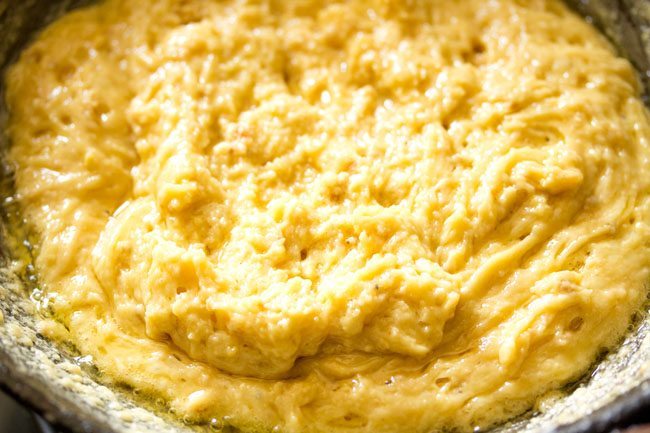
28. When the mixture comes together in one mass and you see some ghee at the sides, then continue to stir and scrape.
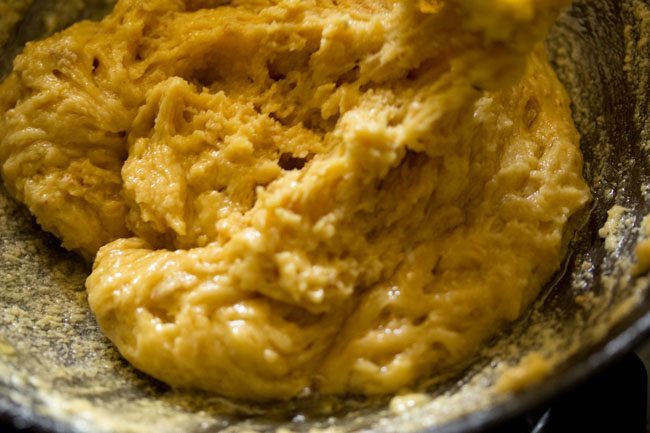
29. When you see many small bubbles and holes in the mixture, then switch off the heat. When you reach this soft-ball stage, you have to be attentive. A few seconds here or there will ruin the texture of the mysore pak.
If you have a candy thermometer, you’re looking for a temperature of 112C/234F.
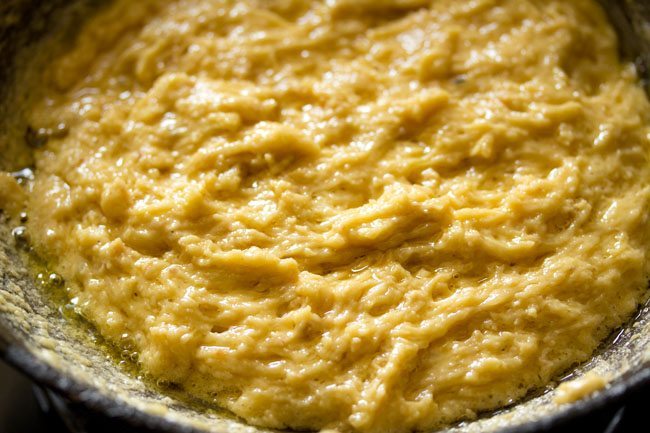
30. If you cook too much, then you will get a very hard mysore pak. The following picture is to show you the texture to get a hard mysore pak.
This photo was taken when working on a recipe – don’t make my mistake! Sharing the photo to show the difference.
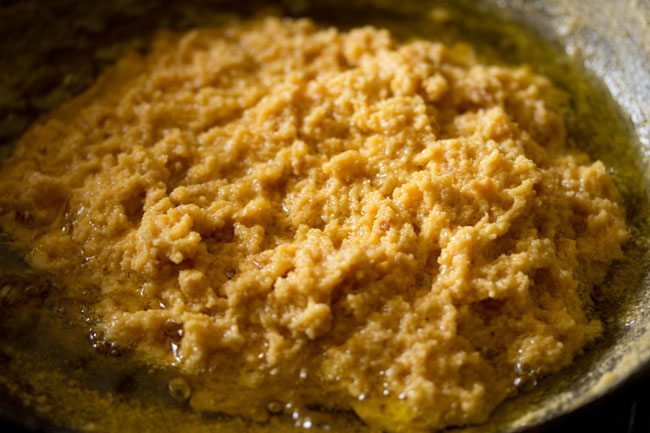
Set Mysore Pak
31. Immediately and quickly tilt the kadai and pour the whole mixture in the greased pan.
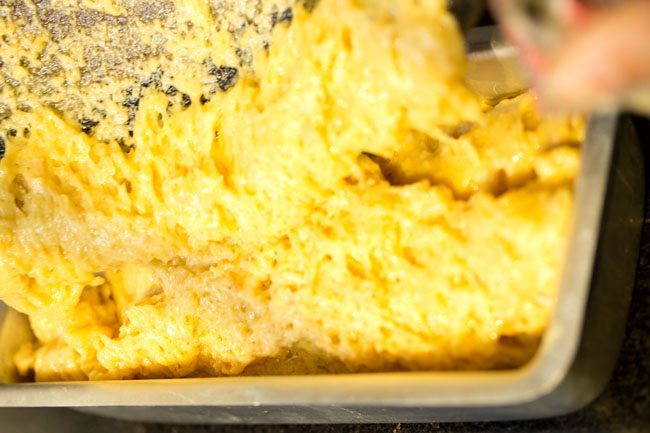
32. It should fall in one lot and you shouldn’t need to use a spoon for it.
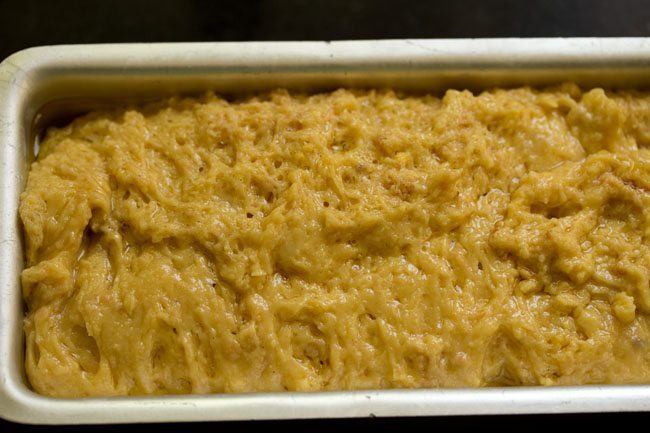
33. Spread it level in the pan with a spatula, the back of small glass or a small steel bowl.
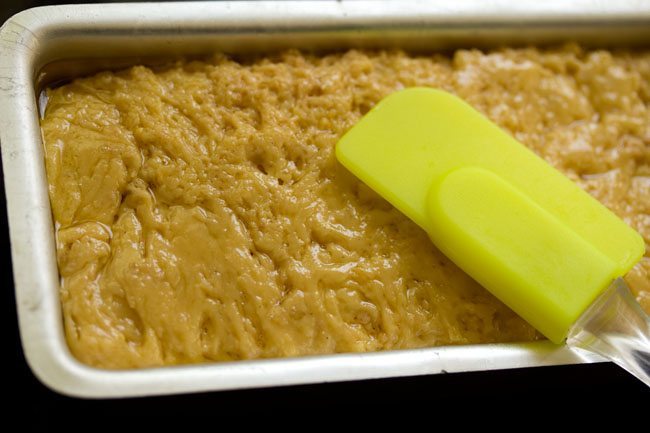
34. Let the mysore pak mixture become warm or cool down. If there is too much ghee at the sides or top, then invert the pan after 20 to 30 minutes, so that the excess ghee is removed. You can use this ghee while preparing dosa or greasing idli plates.
Once cooled enough to handle, then just invert the pan on a chopping board or tray or plate. Tap the sides and the bottom of the pan. The mysore pak block should fall out of the mold easily.
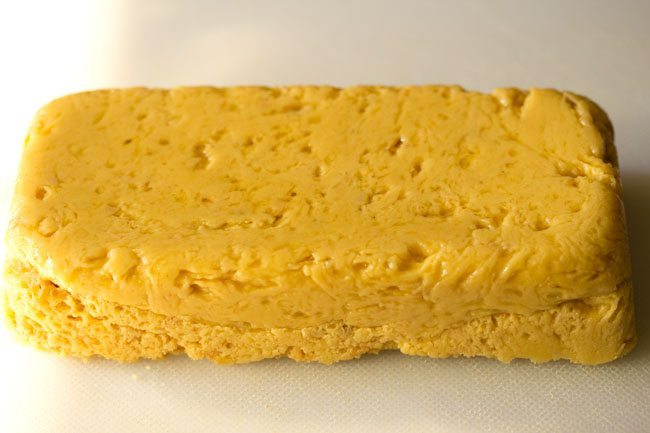
35. Slice the mysore pak into your desired shape. Store in an air-tight container.
Mysore pak keeps well for 7 to 10 days at room temperature.
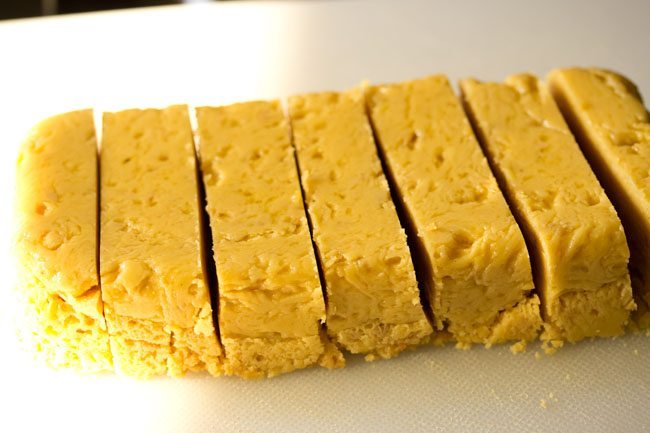
36. Serve mysore pak as a festive sweet to your loved ones. Enjoy!
If you’re still feeling intimidated, check out this easy recipe for 7 Cup Cake. It’s, well, a piece of cake to make!
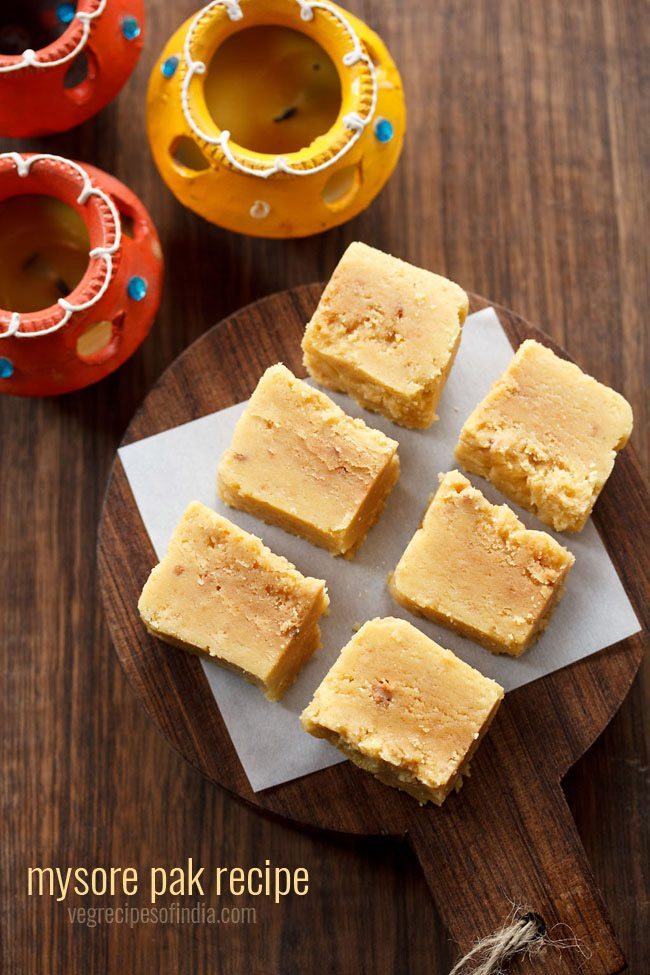
FAQs
Sounds like you cooked it too long. Remember, the sugar syrup should just begin to boil before adding the gram flour.
Once the gram flour is incorporated, immediately begin to add the ghee, being careful to work in stages. After each stage, the ghee should be fully incorporated.
Continue to cook and stir – scraping the bottoms and sides of the pan – until the mixture separates just slightly.
Unfortunately, I don’t recommend it. Much like making fudge, the best technique comes from hand stirring – this will help you really feel the mixture so you can stop at the right moment.
Sure! Just dry toast it in a pan for 2 to 3 minutes before adding. The procedure will not change.
That’s another problem of overcooking. Don’t worry, though – not all is lost! The crumbles taste very good over ice cream. I’m speaking from first hand experience!
Looks like you didn’t cook it quite enough. Add the runny mixture back to the kadai and continue to cook and stir until it is lightly greasy from the ghee beginning to separate.
More Festive Sweets To Try!
Sweets Recipes
Halwa Recipe
Ladoo Recipes
Sweets Recipes
Please be sure to rate the recipe in the recipe card or leave a comment below if you have made it. For more vegetarian inspirations, Sign Up for my emails or follow me on Instagram, Youtube, Facebook, Pinterest or Twitter.
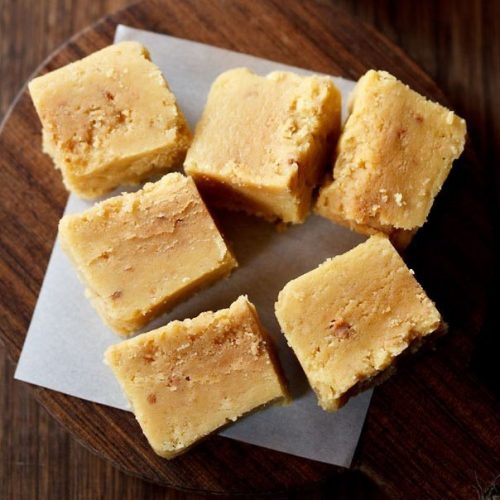
Mysore Pak Recipe
Ingredients
- 1.25 cups sugar – 200 to 210 grams
- 1 cup gram flour (besan) – 100 grams
- 1 cup Ghee (clarified butter) – 200 to 210 grams ghee
- ½ cup water
Instructions
Preparation
- Firstly measure all the 3 ingredients and set aside – sugar, gram flour and ghee.
- Sieve the gram flour once or twice. This helps in reducing the lumps if any while mixing gram flour in the sugar syrup.
- Grease a pan or tray with some ghee. Use a pan or tray which can give you some depth and height, so that you can get rectangular or square pieces.
Making sugar syrup
- Now take the sugar in a heavy thick bottomed kadai. Since a lot of stirring happens, I would suggest you to use a heavy and large aluminium or iron kadai. Please do not use non stick pan as due to the heat and lot of stirring, the non stick coating can get affected.
- Add ½ cup water in the sugar.
- Keep the pan on the stove top. On a medium-low or medium flame, heat the sugar syrup.
- Stir so that the sugar dissolves.
Melting Ghee
- Meanwhile also take the ghee in another pan and keep it on stove top. Let the ghee melt on a low flame or sim.
- The ghee has to be hot when we add it in the gram flour mixture. So let it be on a slow simmer.
Adding Gram Flour to Sugar Syrup
- Let the sugar syrup start bubbling and boiling. We are not looking for one string consistency in the sugar syrup. Just let the sugar solution come to a boil and then add the gram flour.
- Add the gram flour in three to four portions. First add some of the gram flour.
- With a wired whisk, stir the gram flour briskly, so that it dissolves with the sugar solution.
- With one hand using a spoon, add the gram flour and with the other hand mix it with a wired whisk.
- Finish of all the gram flour this way.
- Stir very well, so that the gram flour has got mixed evenly with the sugar syrup.
Adding Ghee
- Then add ghee in parts. First add a ladle full of the hot ghee.
- You will see a lot of bubbles and frothing in the gram flour mixture after you add ghee.
- As soon as you add ghee, mix it with the gram flour with a spoon or spatula. Using a ladle, with one hand, add ghee and with the other hand mix it with a spatula.
- Then add the second portion of ghee and again mix it very well. Keep the heat to a medium-low or medium.
- This way finish off adding all the ghee in parts. Mix thoroughly.
- Do use a bigger kadai and also some gloves on your hands, as there is a lot of sizzling, frothing and bubbling that happens.
Cooking Mysore Pak Mixture
- All the ghee will be absorbed first and what you will see is a smooth molten gram flour mixture.
- On a medium-low to medium heat with non-stop stirring cook the gram flour mixture.
- You have to continue to cook and stir till you start seeing many bubbles in the mixture and the ghee is released from it. So continue to cook and stir. The mixture will also start to leave the sides of the kadai or pan.
- While stirring also scrape the bottom of the kadai and the sides. If you do not scrape, then the mixture starts sticking and gets browned or burnt.
- So you have to stir nonstop and scrape. Do use a flat steel spatula (palta) as this helps in scraping the gram flour mixture.
- When the mixture comes together in one mass and you see some ghee at the sides, then also continue to stir and scrape.
- When you see many small bubbles and holes in the mixture, then switch off the heat.
- If you cook too much, then you will get a very hard mysore pak.
Setting Mysore Pak
- Immediately and quickly tilt the kadai and pour the whole mixture in the pan. It falls in one lot and you don’t need to use any spoon for it.
- Level with a spatula or the back of small glass or a small steel bowl.
- Let the mysore pak mixture become warm or cool down.
- If there is too much ghee at the sides or top, then invert the pan after 20 to 30 minutes, so that the excess ghee is removed. You can use this ghee while preparing dosa or greasing idli plates.
- Once warm or cooled, then just invert the pan on a chopping board or tray or plate. Tap the sides and the bottom of the pan. The mysore pak block falls of easily.
- Then cut the mysore pak into rectangular or square pieces.
- Store in an air-tight container. It stays good for about a week to ten days at room temperature.
- Serve as a festive sweet to your family or friends.
Nutrition Info (Approximate Values)
This Mysore Pak recipe from the archives first published in October 2016 has been republished and updated on 22 October 2022.
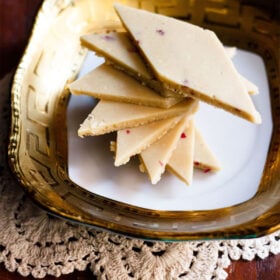
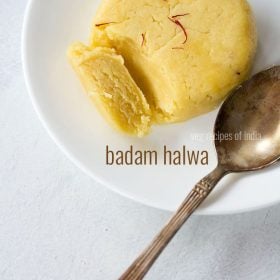
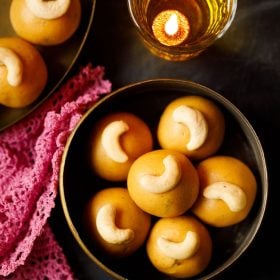
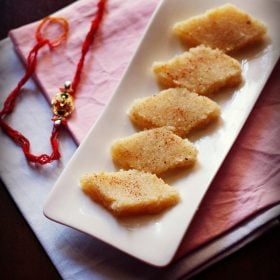
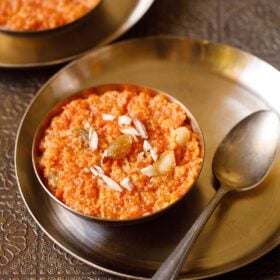
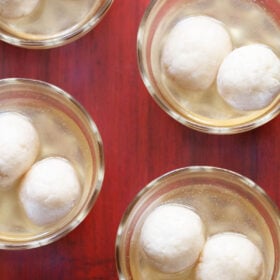








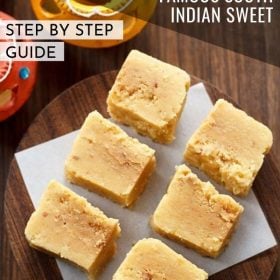
I tried this recipe just now and it is awesome. Loved the way you have mentioned the crucial times to look out for. Thanks a lot dassana. Will ever be grateful!
Thanks a lot Shweta and glad that the recipe was a success. Thanks for the rating too.
I tried it the first time for my mother in law’s birthday since it is her favorite sweet and it turned out well. Thank you so much
Great and thanks for sharing.
Dassana! Thank you so much for this recipe and all the other recipes in your blog too. I never look elsewhere when i need a good recipe.
Today i made mysore pak for the first time ever in my life for my daughter. I read your recipe and i exactly like the texture you have described. I followed your recipe to the T and i got exactly what you got there… Even by looks 🙂 taste and texture is too good. Thank you.. Can this be doubled for making larger quantity?
Nice to know and thanks a lot for the feedback and the rating, Amritha. Yes of course you can double the recipe, but it would need a lot of arm-work to stir the mixture.
Hi Dassana…
When I was stirring the mixture, after adding ghee…. there was lot of ghee floating around….
I kept stirring; thinking it will get absorbed, but it did not.
I had of course taken the 200 grams ghee which you mention in the recipe.
So, after a little more stirring, I emptied out the ghee into a steel vessel, and then set the Mysore Pak.
When I inverted it, it turned out to be very hard…
Where did I go wrong?
Thanks for your reply.
Nikhil
Hi Nikhil, looks like the pak mixture has been cooked too much and hence the hardness. It looks like the sugar syrup has got cooked to half-string or one string consistency when the ghee was added and this is the reason the ghee was not getting absorbed. The sugar syrup just needs to be hot & bubbling and all the sugar has to be dissolved before besan is added. Depending on the size of the pan, thickness of the pan and the flame intensity, the timing will change and this can overcook or undercook the dish. So by the time the ghee was added, the sugar had already started thickening. The texture of mysore pak comes from the sugar syrup. So for a semi-hard to hard mysore pak, it should be 2 to 3 string consistency works when the pak mixture is inverted in the pan. For a soft texture it should be 1 to 1 and ½ string consistency when the mixture is inverted in the pan. I hope this helps.
Hi Dassana,
I tried this recipe step by step and the mysore pak came out amazing. It was soft and without any lumps. Thanks for the tips.
Regards,
Kezia
Great to know and thanks for sharing the lovely feedback and the rating as well. Welcome and happy cooking.
Dear Dassana
Have been a regular visitor to your site and made some amazing food for my family.
However chose to send a comment for this recipe as this was my mother’s super dish. She was the ultimate expert. Your recipe was the closest to hers. She used to use homemade ghee for her recipe.
Thanks for this amazing recipe and bringing back the sweetest memories.
dear vaijayanti. that is so touching to know and thank you for sharing a part of your sweetest memories here. i am touched and grateful as well. thanks again and wish you all the best.
Hello Dassana,
I tried this mysore pak recipe today. And it turned out well. My whole family loved it. Thank you so much.
glad to know shilpa and thank for sharing the feedback. happy cooking.